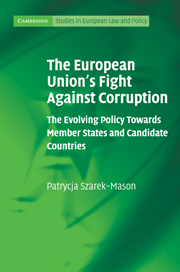 The European Union's Fight Against Corruption
The European Union's Fight Against Corruption Book contents
- Frontmatter
- Contents
- Table of cases
- Acronyms and abbreviations
- List of tables and figures
- Introduction
- 1 Corruption: concept, importance and international response
- 2 The scope of EU legal powers and development of the policy in the area of anti-corruption
- 3 The EU strategy against corruption within the Member States
- 4 Conditionality in the EU accession process
- 5 The EU's evaluation of corruption in the Central and Eastern European candidate countries
- 6 The EU anti-corruption strategy towards the Central and Eastern European candidate countries: achievement or missed opportunity?
- 7 The impact of 2004 enlargement on the EU anti-corruption policy
- 8 Conclusion
- List of interviews and consultations
- Appendix 1
- Appendix 2
- Bibliography
- Index
- CAMBRIDGE STUDIES IN EUROPEAN LAW AND POLICY
2 - The scope of EU legal powers and development of the policy in the area of anti-corruption
Published online by Cambridge University Press: 03 May 2010
- Frontmatter
- Contents
- Table of cases
- Acronyms and abbreviations
- List of tables and figures
- Introduction
- 1 Corruption: concept, importance and international response
- 2 The scope of EU legal powers and development of the policy in the area of anti-corruption
- 3 The EU strategy against corruption within the Member States
- 4 Conditionality in the EU accession process
- 5 The EU's evaluation of corruption in the Central and Eastern European candidate countries
- 6 The EU anti-corruption strategy towards the Central and Eastern European candidate countries: achievement or missed opportunity?
- 7 The impact of 2004 enlargement on the EU anti-corruption policy
- 8 Conclusion
- List of interviews and consultations
- Appendix 1
- Appendix 2
- Bibliography
- Index
- CAMBRIDGE STUDIES IN EUROPEAN LAW AND POLICY
Summary
Similarly to other international organisations, the EU responded to the problem of corruption in the second half of the 1990s. It addressed corruption in its own characteristic way corresponding with its goals, its structure and, most importantly, its competences. This chapter provides a legal and historical context for the development of the EU policy, setting a useful background for a detailed discussion of the legislative and institutional framework against corruption in the next chapter.
The chapter first outlines what the EU can possibly do to prevent and fight corruption within the Member States and what are the legal and political constraints of EU action. The anti-corruption acquis is complex from a legal point of view. The competences in the area of anticorruption are divided between Member States and the EU. In addition, combating corruption is a cross-pillar matter, regulated under both European Community (EC) and EU treaties.
The chapter starts with an analysis of the available legal bases under the EC Treaty (also known as the ‘first pillar’) and explains that the Community has very limited legal powers with regard to preventing and combating corruption within the Member States. Next, the chapter discusses the competences under Title VI of the EU Treaty regulating police and judicial cooperation in criminal matters (also known as the ‘third pillar’) and argues that the action of the EU is restrained by political, rather than legal factors. The legislative and institutional framework under both Treaties was substantially amended by the Treaty of Lisbon.
- Type
- Chapter
- Information
- The European Union's Fight Against CorruptionThe Evolving Policy Towards Member States and Candidate Countries, pp. 43 - 88Publisher: Cambridge University PressPrint publication year: 2010


